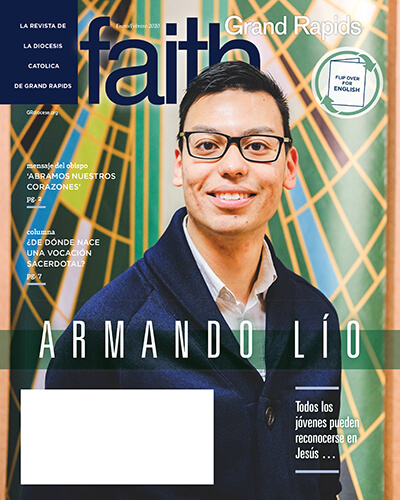
by Zulema Moret
In his “Post-Synodal Apostolic Exhortation, Christus Vivit,” Pope Francis addresses all young people and the people of God, based on a set of considerations that cover different aspects related to youth, from the presence of young people in the Old Testament, in the New Testament, and following the figure of Jesus, always young, and models of love for all the young people of the world. This text becomes very effective and important when we refer to youth ministry, as it guides and advises those involved in youth ministry: “lest we create projects that isolate young people from their family and the larger community, or turn them into a select few, protected from all contamination. Rather, we need projects that can strengthen them, accompany them and impel them to encounter others, to engage in generous service, in mission…” (v.30)
Jesus, from his own youth, illuminates the movements of young people in youth ministry, serving as a guide and model, while he also had the courage to confront the religious and political authorities of his time, he lived the experience of feeling misunderstood, he felt fear at the front of suffering, expressed deep compassion for the poorest, and helpless. In his text, Pope Francis adds: “In Jesus, all the young can see themselves” (v.31).
WHAT THE CHURCH NEEDS TO DO IN RELATION TO THE YOUTH…
To understand the steps taken by groups of young adults in our Diocese of Grand Rapids, we have spoken with Javier Orozco, one of the leaders, who enthusiastically tells us about his experience with the group and its history:
“From what I have heard from young people who actively participate, they mostly feel that they lack love, or sometimes feel attacked. They do not understand the scriptures, the symbols, and that at the end of the day what we need is love. We know that God is love, at every Mass we receive that true love. That is why, as Catholics, we must make a better example of that love.” That estrangement from love, a source of life, is what causes young people to retreat. According to Javier:
“Young people who were born Catholic, as Hispanics have not felt that love since they were children. If, as a Church we had done a better job, based on love, that would not happen, they would have stayed.” This would somehow explain why they turn away from the Church and turn to other shelters such as varied addictions or suffer symptoms of depression, isolation, loneliness. Personally, for Javier: “You have to form that intimate relationship with God, because if you love God and want to know him more and more, you find pure love, as long as the purest way of Love is God.”
We know, as Pope Francis emphasizes in his document, that some young people feel family traditions as oppressive and flee from them driven by a globalized culture that sometimes leaves them without reference points. Faced with the adult attack, the young person escapes and takes refuge in other realities that take him away from his family and from God.
A PERSONAL EXPERIENCE THAT LEADS TO A PASTORAL YOUTH
Javier tells us some relevant aspects of his life:
“I have always been part of the Church. My faith grew at different stages. In college I wanted to go to Mass, but it was a different experience than going with family. I felt that emptiness, I had just turned 18, started to get involved, but I found it difficult. That’s why forming the “Armando Lío” group was filling a void, I saw that there was a void in the group of young people. I started attending retreats, courses and I couldn’t fully integrate because I felt that emptiness. For that age range that ranges from 18 to 35, no one was doing anything. After turning 18 they leave the Church.”
Later, Javier attended the V Encuentro where he met Marisa and other young people who wanted to do something and this meeting led to a process of socialization, of support, as a group of young active Catholic Hispanic adults.
Javier explains the process of support group formation and socialization: “We are together and knowing that there is more who feel like being in the Church and do not know how. Then we started thinking about how to help these young people like us.”
BEING THE VOICE OF YOUNG PEOPLE IN FUTURE PROCESSES
The group’s mission was consolidated, based on the goal of “the young Hispanic adult finding that personal relationship with God and deepening it.” That’s why among their nearest goals is to help churches that don’t have active groups of young teens and adults meet and form groups in their respective parishes so that they can then carry out self-management in their own communities . It is essential for Javier to recognize the reality of each Church, for “each Church has its own reality, young Hispanics of second generation, migrant space…”
The active members of the youth group “Armando Lío” are thirteen in total, although they are trying to incorporate more young people into their group, and are part of four local parishes: St. Francis Xavier, St. Francis de Sales, St. Joseph the Worker, and Our Lady of the Sorrows. The ages of young adult groups range from 18 to 35 years old and Javier Orozco is the coordinator of the St. Francis Xavier youth group.
Regarding his activities and plans for the future, Javier concludes: “We go out to camps, we have different ideas at the diocesan level, we support projects that are in process such as the workshops of Quinceañeras in the Diocese, for April we plan to organize Youth Easter and we are preparing to lead and plan other projects. We want to be the voice of young people in processes already active in the diocese.”
As Pope Francis reminds us in his exhortation: “God is the giver of youth and he is at work in the life of each young person. Youth is a blessed time for the young and a grace for the Church and for the world.” (v. 135). May Jesus accompany the steps of Javier and the group of young adults in his parishes so that his presence may be reflected in future actions, in the light of the Gospel and the Love of God.
This is the English translation of the Spanish cover story from the January/February 2020 issue of FAITH Grand Rapids magazine.



